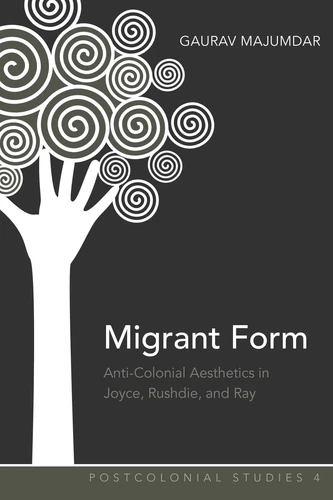Migrant Form. Anti-colonial Aesthetics in Joyce, Rushdie and Ray
Par :Formats :
- Paiement en ligne :
- Livraison à domicile ou en point Mondial Relay indisponible
- Retrait Click and Collect en magasin gratuit
- Nombre de pages169
- ISBN978-1-4331-0503-6
- EAN9781433105036
- Date de parution01/02/2010
- CollectionPostcolonial Studies
- ÉditeurPeter Lang
Résumé
Migrant Form examines the works of James Joyce, Salman Rushdie, and Satyajit Ray for the anti-colonial arguments in their unsettled, and unsettling, aesthetics. Among the questions it engages are the following : What are the aesthetic moves through which art expresses its resistance to dominance and demands for conformity ? How can we define anti-colonial aesthetics ? How do these aesthetics manifest themselves in different media such as literature and film ? Contending that Joyce inaugurates an anti-colonial "aesthetics of reconstitution", the book mines such aesthetics in Ulysses and Finnegans Wake to propose a formal model for postcolonialism.
It also draws on that exercise to consider how Rushdie extends a play with reconfigured forms into an overt politics in two of his novels (Midnight's Children and The Satanic Verses). Turning its attention to film, the book contests the common view of Ray as a gentle realist and examines a formal restlessness in Ray's earlier work, Charulata (The Lonely Wife), before demonstrating how Ray stages his preference for restlessness in his final film, Agantuk (The Stranger).
It also draws on that exercise to consider how Rushdie extends a play with reconfigured forms into an overt politics in two of his novels (Midnight's Children and The Satanic Verses). Turning its attention to film, the book contests the common view of Ray as a gentle realist and examines a formal restlessness in Ray's earlier work, Charulata (The Lonely Wife), before demonstrating how Ray stages his preference for restlessness in his final film, Agantuk (The Stranger).
Migrant Form examines the works of James Joyce, Salman Rushdie, and Satyajit Ray for the anti-colonial arguments in their unsettled, and unsettling, aesthetics. Among the questions it engages are the following : What are the aesthetic moves through which art expresses its resistance to dominance and demands for conformity ? How can we define anti-colonial aesthetics ? How do these aesthetics manifest themselves in different media such as literature and film ? Contending that Joyce inaugurates an anti-colonial "aesthetics of reconstitution", the book mines such aesthetics in Ulysses and Finnegans Wake to propose a formal model for postcolonialism.
It also draws on that exercise to consider how Rushdie extends a play with reconfigured forms into an overt politics in two of his novels (Midnight's Children and The Satanic Verses). Turning its attention to film, the book contests the common view of Ray as a gentle realist and examines a formal restlessness in Ray's earlier work, Charulata (The Lonely Wife), before demonstrating how Ray stages his preference for restlessness in his final film, Agantuk (The Stranger).
It also draws on that exercise to consider how Rushdie extends a play with reconfigured forms into an overt politics in two of his novels (Midnight's Children and The Satanic Verses). Turning its attention to film, the book contests the common view of Ray as a gentle realist and examines a formal restlessness in Ray's earlier work, Charulata (The Lonely Wife), before demonstrating how Ray stages his preference for restlessness in his final film, Agantuk (The Stranger).

